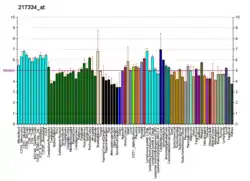| OR2J3 | |||||||||||||||||||||||||||||||||||||||||||||||||||
|---|---|---|---|---|---|---|---|---|---|---|---|---|---|---|---|---|---|---|---|---|---|---|---|---|---|---|---|---|---|---|---|---|---|---|---|---|---|---|---|---|---|---|---|---|---|---|---|---|---|---|---|
| Identifiers | |||||||||||||||||||||||||||||||||||||||||||||||||||
| Aliases | OR2J3, 6M1-3, C3HEXS, HS6M1-3, OR6-16, OR6-6, OR6.3.6, ORL671, olfactory receptor family 2 subfamily J member 3 | ||||||||||||||||||||||||||||||||||||||||||||||||||
| External IDs | OMIM: 615016 HomoloGene: 128270 GeneCards: OR2J3 | ||||||||||||||||||||||||||||||||||||||||||||||||||
| |||||||||||||||||||||||||||||||||||||||||||||||||||
| |||||||||||||||||||||||||||||||||||||||||||||||||||
| |||||||||||||||||||||||||||||||||||||||||||||||||||
| |||||||||||||||||||||||||||||||||||||||||||||||||||
| Wikidata | |||||||||||||||||||||||||||||||||||||||||||||||||||
| |||||||||||||||||||||||||||||||||||||||||||||||||||
Olfactory receptor 2J3 is a protein that in humans is encoded by the OR2J3 gene.[3]
Olfactory receptors interact with odorant molecules in the nose, to initiate a neuronal response that triggers the perception of a smell. The olfactory receptor proteins are members of a large family of G-protein-coupled receptors (GPCR) arising from single coding-exon genes. Olfactory receptors share a 7-transmembrane domain structure with many neurotransmitter and hormone receptors and are responsible for the recognition and G protein-mediated transduction of odorant signals. The olfactory receptor gene family is the largest in the genome. The nomenclature assigned to the olfactory receptor genes and proteins for this organism is independent of other organisms.[3]
Genetic variation
A pair of two single-nucleotide polymorphisms, both in the OR2J3 gene, strongly reduce sensitivity to the odorant cis-3-hexen-1-ol, which has a "cut grass" smell.[4]
Ligands
See also
References
- 1 2 3 GRCh38: Ensembl release 89: ENSG00000204701 - Ensembl, May 2017
- ↑ "Human PubMed Reference:". National Center for Biotechnology Information, U.S. National Library of Medicine.
- 1 2 "Entrez Gene: OR2J3 olfactory receptor, family 2, subfamily J, member 3".
- 1 2 McRae JF, Mainland JD, Jaeger SR, Adipietro KA, Matsunami H, Newcomb RD (September 2012). "Genetic variation in the odorant receptor OR2J3 is associated with the ability to detect the "grassy" smelling odor, cis-3-hexen-1-ol". Chemical Senses. 37 (7): 585–93. doi:10.1093/chemse/bjs049. PMC 3408771. PMID 22714804.
- ↑ Mainland JD, Keller A, Li YR, Zhou T, Trimmer C, Snyder LL, et al. (January 2014). "The missense of smell: functional variability in the human odorant receptor repertoire". Nature Neuroscience. 17 (1): 114–20. doi:10.1038/nn.3598. PMC 3990440. PMID 24316890.
Further reading
- Fuchs T, Malecova B, Linhart C, Sharan R, Khen M, Herwig R, et al. (September 2002). "DEFOG: a practical scheme for deciphering families of genes". Genomics. 80 (3): 295–302. CiteSeerX 10.1.1.135.3652. doi:10.1006/geno.2002.6830. PMID 12213199.
- Malnic B, Godfrey PA, Buck LB (February 2004). "The human olfactory receptor gene family". Proceedings of the National Academy of Sciences of the United States of America. 101 (8): 2584–9. Bibcode:2004PNAS..101.2584M. doi:10.1073/pnas.0307882100. PMC 356993. PMID 14983052.
External links
- OR2J3+protein,+human at the U.S. National Library of Medicine Medical Subject Headings (MeSH)
This article incorporates text from the United States National Library of Medicine, which is in the public domain.


